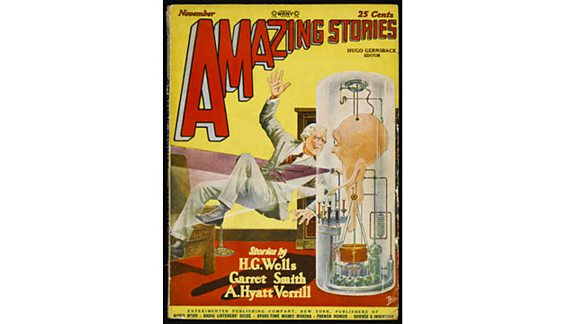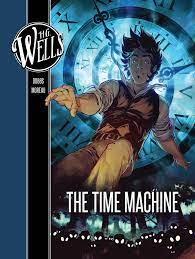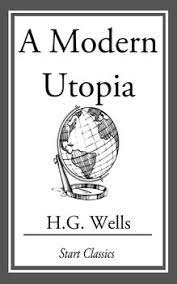“Presently I noted that the sun belt swayed up and down, from solstice to solstice, in a minute or less, and that consequently my pace was over a year a minute; and minute by minute the white snow flashed across the world, and vanished, and was followed by the bright, brief green of spring.”
― H.G. Wells, The Time Machine

Meet H.G Wells

Born on September 21, 1866, Herbert George Wells widely considered to be the ‘Father of Science Fiction’ was the fourth and last child of his parents. He wrote over fifty novels, dozens of short stories and several other works on politics, satire, popular science etc.
(Image credit: Wikipedia)
But he wasn’t just an iconic writer. He was hailed as a futurist who made use of his literary arsenal to the development of a progressive vision on a global scale. A lot of his works foresaw the advent of aircraft, tanks, space travel, nuclear weapons etc. while imagining time travel, alien invasion, invisibility, and biological engineering.
Apart from his contributions to science fiction, he also gave rise to something called “Wells’s Law” which stated that only one plot element requires the audience to suspend their disbelief.
He died on August 13, 1946, at the age of 79 at his home due to unspecified causes. And in an interesting literal turn, in his preface to the 1941 edition of The War in the Air, Wells had stated that his epitaph should be:
“I told you so. You damned fools”.

Origin of science fiction as a literary genre
Science fiction came to the fore nearly 3 centuries ago when great advances were taking place on the scientific front. Dystopian worlds, alien invasions, robots etc have played a crucial role in not only moulding this genre but also popularising it. At a time of scientific advancements, it makes sense why authors would have let their imagination run free to make sense of potential futures.
Gulliver’s Travels (1726) by Jonathan Swift is considered by many to be a critical precursor to the modern sci-fi novel with its flying islands and dystopian societies. This was as early as 1726. Numerous other works such as Frankenstein (1818) by Mary Shelling which appeared shocking to the deeply religious Victorian people, Twenty Thousand Leagues Under the Sea by Jules Verne (1870) which imagined diving equipment while also expanding on submarine technology.
“The tiny Lilliputians surmise that Gulliver’s watch may be his god, because it is that which, he admits, he seldom does anything without consulting.”
― Jonathan Swift, Gulliver’s Travels: Travels into Several Remote Nations of the World.
The term ‘Science Fiction was coined by journalist, Hugo Gernsback in his magazine Science Wonder Stories in 1929, over 2 centuries after Gulliver’s Travels was published.

Credit: Mary Evans Picture Library
George Orwell’s Nineteen Eighty-Four (1949) and Isaac Asimov’s I, Robot (1950) dealt with a totalitarian Britain where individual freedoms were curtailed and the idea of robots playing a role in daily society introducing the iconic Asimov’s Three Laws of Roboticsrespectively further contributed to the evolution of this genre.
The Hitchhiker’s Guide to the Galaxy (1979) by Douglas Adams produced a fresh spin on science fiction infusing humour in an apparent parody of life across the Universe making use of conventional sci-fi themes such as rebellious technologies, time travel, galactic catastrophes and cosmic bureaucracy.

“Space is big. You just won’t believe how vastly, hugely, mind-bogglingly big it is. I mean, you may think it’s a long way down the road to the chemist’s, but that’s just peanuts to space.”
― Douglas Adams, The Hitchhiker’s Guide to the Galaxy
William Gibson, famed for his prophetic visions of technology established cyberpunk as a sub-genre of sci-fi shedding light on a society controlled by computers through his book Neuromancer (1984). He is also believed to be the first to use the word ‘Matrix’ meaning a virtual space.
The Mars trilogy (1993) by Kim Stanley Robinson explored themes of colonisation, specifically that of Mars as an attempt to create an analogy to USA’s western expansion. It reintroduces the role of humans in this tale of extraterrestrial migration.
Science fiction has attained the position of a core literary genre, beloved by many for its bold and fresh perspectives and the freedom it offers to explore the intersection of science, fantasy and how humanity figures in all of it. Several writers today including but not limited to Dan Brown, Margaret Atwood, Liu Cixin, Stephen King, George R.R Martin etc continue to fuel this genre.

Why is he the father of science fiction?
As mentioned, Wells was often considered to be a futurist. He found science fiction to be a medium to enlighten people and open their minds to new avenues of thinking. Hailed as the father of science e fiction and rightly so, he introduced early concepts of time machines, nuclear weapons, and aeroplanes. His books were devoured by the public for their bold addressing of novel themes and ideas considered, revolutionary at the time – ideas which were grounded in realism.
H.G. Wells is widely considered to be “the father of science fiction” because apart from introducing new notions, he also played a critical role in shaping the genre we’ve all come to adore.
Known for:
(all the images below are from Simon & Schuster)






“But-! I say! The common conventions of humanity-‘
‘Are all very well for common people.”― Wells, H. G. (Herbert George), The Invisible Man

Well, I hope you had an interesting read! Science fiction is my favourite out of all the genres and I had a lovely time researching and writing about the person who played such a crucial role in moulding it!
Given below are the sources I referred to – they make for excellent reading!
- https://earlybirdbooks.com/hg-wells
- https://www.bbc.co.uk/teach/writing-the-future-a-timeline-of-science-fiction-literature/zjfv6v4#:~:text=The%20origin%20of%20the%20term,prophetic%20vision%20and%20scientific%20knowledge.
- https://en.wikipedia.org/wiki/H._G._Wells
Thanks so much for reading!

I love his “War of the Worlds” and hope to read “The Time Machine” soon. Amazing article!
LikeLiked by 1 person
Ooh, same Kaley! I’ve yet to read The Time Machine too, haha!
Thanks so much!
LikeLiked by 1 person
Damn how do you even know so much 😭🤩!!!!???!!
But we need more of this obviously!!! This was so insightful. The invisible man has been on my tbr for a long time, but after my weird experience with classics I’ve put it off for now. Not to mention i also dnfed the hitchhikers series in the middle of book 2. But i still consider myself a sci-fi fan as long as it’s not too much involved in numbers and figures but feels a bit more familiar and closer to the world we know.
LikeLiked by 1 person
I don’t 😂 I pick a topic and research on it (all hail Google 🤺😂) and then I write on it.
Aw thank you! I enjoy writing articles like this immensely!
Ooh you definitely should read it! I remember loving it when I read it!
*gasp* I actually love that book too 🥺😂
Ooh, that’s interesting! I like sci-fi that’s really involved in science and is novel in its plot.
Loved getting to know more about your sci-fi preferences! Thank you so much for reading!❤️
LikeLiked by 1 person
This article was really entrancing!! Never knew that sci-if begun SO long ago! I kinda thought it started around the 70s. 😂 Good post, D!
LikeLiked by 1 person
Millay!! It’s absolutely wonderful to see you back!
Thanks so much! Same!✋😂
Can’t wait to read your posts soon!
LikeLiked by 1 person
Thank you!
LikeLiked by 1 person